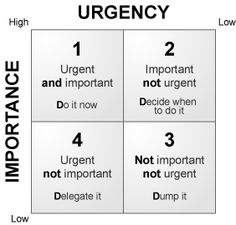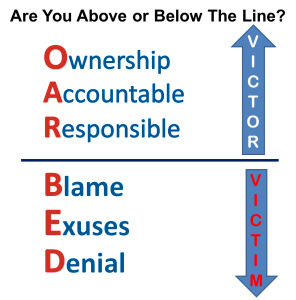Jun 6, 2016 | Planning & Goal Setting, Self, Time Management
Time – Can You Ever Get Enough?
Whether you own a business or work for someone who does, you have probably experienced the “never enough time” phenomenon. When I worked in the high tech world, the saying was always that there was never enough time to do it right, but always plenty of time to go back and fix it later. This practice was also known as using the customers for beta testing.
If we want our businesses and ourselves to thrive, then we must take the time to do things right. We must also be focused on doing the right things. Stephen Covey, in his book “The 7 Habits of Highly Effective People” offers a powerful tool, the matrix based on Urgency vs. Importance to achieve both of these goals.
In this matrix, Quadrant 2, is a set of activities in a business, or your life, that are Not Urgent, but are Important –  this quadrant is the Zone. The Zone is that place where you set aside all the busy work of the day and focus on the things that are truly important for the long-term success of your business and your life. These are activities like planning, strategy, learning and cultivating relationships.
this quadrant is the Zone. The Zone is that place where you set aside all the busy work of the day and focus on the things that are truly important for the long-term success of your business and your life. These are activities like planning, strategy, learning and cultivating relationships.
So how do we get in The Zone? First and foremost, you have to make a conscious decision to go there. It will not happen naturally, because these tasks are not urgent, they are not in your face demanding attention! When was the last time your most important client called you up and demanded that you get to work on your budget? Probably never, but when was the last time a client complained that you didn’t have the right parts in stock, or that you delivered her order a week late? Did you take the time to tell them that earlier this year you failed to budget for sufficient stock, or that you failed to plan the replacement of that machine that you knew was on its last legs? This is one of the hardest things for my clients to see, they are constantly in the “urgency” quadrant, specifically because they don’t spend enough time in the zone. Every day I hear about how overwhelmed they are, because of all the urgent daily demands. Getting in the Zone takes practice in order to become a habit. Here are some tips for how to do so.
-
Put it on your calendar on a regular basis
Scheduling time for planning activities is probably the best and maybe the only way to ensure that they get done. You should spend 20% of your time in Zone activities, but that doesn’t necessarily have to be weekly, it could be on a monthly or quarterly basis. One way is to allocate 4 hours per week to planning (medium-long term, not short term), an additional 8 hours per month, perhaps a couple of half-day sessions, and then an additional 16 hours per quarter, perhaps in an off-site session or two.
-
Establish a system for accountability
To help you reinforce the need and the habit. This can take the form of a coach, an accountability partner, a mastermind group, a partner, a spouse or any other person that you will feel accountable to for following through. Be sure that they know to ask you when you are allocating your time, and how you intend to spend it. Be sure that you have deliverables to them for the output of your planning, then review and discuss it with them.
-
Break up the work and the time into proper-sized chunks
Some people work best in 30-45 minute bursts, other prefer 2 hour chunks of time. Pay attention to your own attention span and work style and allocate the most efficient periods of time for you to get your work done. Break up the work into properly sized chunks so that you can accomplish something meaningful in each time period. Know yourself, and when you set aside your Zone time, make sure the chunks of time will be most effective for you.
-
Pick the right time of day for your Zone activities
In every business and for every person, there are times of day or days of the week that are better or worse than others. If you know that Monday mornings are always crazy, don’t allocate any Zone time for Mondays. You also know your own daily cycles, so be sure to schedule your Zone time at a time of day that is best for the type of thinking you will be doing – creative out of the box brainstorming or detailed number-crunching.
If you want your business to be a long term success, it takes this kind of intentional disciplined planning. Success rarely happens by mistake, so be sure that you are always planning for success, not just this week, but for the next decade.
If you want to really learn how to get into the Zone, come to my TimeWise workshop Friday June 17, 2016 11:30 – 1:00.
Oct 1, 2015 | Self, Team
When things don’t go as planned in your business; schedules missed, customer’s expectations not met, quality of work not up to standards; what do you hear? Blame, excuses, denial? Or ownership of the issue, accountability for the results and responsibility for taking corrective action? If you’re like most business owners, you hear lots of reasons and excuses. How did this culture develop in your company? How did your team come to accept this behavior as the norm in your business?
Look no further than the mirror. It starts with you. Even if you are not the one making excuses, your team has witnessed you enough times accepting blame and excuses. Or visibly punishing mistakes that are not soon forgotten. People learn the acceptable excuses for explaining why they did not achieve their goals. Rewards for exceptional performance barely exceed rewards for the ordinary. And people hide the truth – to be polite and safe – and in denial.
Why is Accountability important?
It closes the gap between intention and action. Between plans and results. Between goals and success. And its the foundation of an ethical business culture. If you focus on or change nothing else but accountability in your business, you will see massive results.
Accountability and empowerment are inseparable. When someone is blaming and making excuses, they see the cause and solution as being outside of themselves. Outside of their control, influence and power. They have no capability or power to change the outcome. Accountability is a promise and an obligation, both personally and to the people around you, to deliver specific, defined results.

Accountable people are aware of the positive and negative consequences of their actions – they want different consequences – they take different actions. A team organized for accountability, to achieve a desired result, immediately becomes interdependent. In order to achieve effective interdependence, you must have the structure to support it in place. Accountability in your business requires structure, focus and clarity that supports and builds trusted relationships and gets results.
Where to Start – Key Principals of Accountability
- A personal promise – that you agree to
- Results means activities are not enough – you do whatever it takes to achieve results
- Results requires room for judgment and decision-making – empowerment to use discretion
- Neither shared nor conditional – you are responsible for your commitments – not shared with another and it is unconditional regardless of limited control, other’s mistakes, or a lack of role clarity.
As soon as you hear yourself saying “ . . . because . . “ STOP, rethink what you’re about to say. Rephrase it until you are clearly taking full responsibility, describing a situation where YOU have control to do something different. Start with you. It will not go unnoticed by your team.
Apr 21, 2015 | Leadership, Self, Team

Are You Leading Or Managing Your Company?
As the owner or chief executive in your company, how much time do you spend on leading and not just managing? If your goal is to create a growing, profitable business that can work without you, strong leadership is a must.
Author William Arthur Ward once wrote, “Flatter me, and I may not believe you. Criticize me, and I many not like you. Ignore me, and I may not forgive you. Encourage me, and I may not forget you.” Leaders come in all shapes, sizes and from all ways of life, but they do have common characteristics.
- They create a vision and understand that true change is driven by emotion, not logic. In other words, they transform the mundane into a passion that their team can rally around. What benefit do you create for your customers? Don’t think you have one? Here are some examples: bankers and financial planners make dreams come true, communications companies educate and inspire, consultants and recruiters create a livelihood for workers, photographers preserve memories. What noble cause does your company provide?
- Leaders know how to link vision and action. It’s not just about a vision; it’s about making that vision come alive. They have a unique way of separating the important from the interesting and then focusing on one of those things.
- Leaders create an environment of accountability. Not only do great leaders demand accountability of themselves, they demand it of their team. Excuses are not allowed.
- Leaders have a strong character and aren’t swayed by what’s easy or popular. When faced with a challenge, they do what is right, not what is easy.
- You are not a leader unless you are willing to make the tough decision.Sure it is easier to say “yes”, than “no”. Charles Nielsen once said, “When, against one’s will, one is pressured into making a hurried decision, the best answer is always ‘No,’ because ‘No’ is more easily changed to ‘Yes’ than ‘Yes’ is changed to ‘No’.” As a leader, it is more important to make the right decision than the easy decision.
- Leaders inspire through their everyday actions and words.You don’t need long speeches or memos to inspire. Lincoln’s, “Gettysburg Address” was less than three minutes long and Churchill’s famous, “Blood, Sweat and Tears” speech was two and a half minutes long. Words are important, but actions inspire even more. Mother Teresa’s credo was, “Let no one come to you without leaving better and happier.”
- Leaders realize that no one, including himself or herself, is indispensable. Once you become bigger than the cause, you cease to lead. Translated into business, teach your team to do things better than you ever could and you will both benefit.
Leadership doesn’t happen overnight, but a mentor, like me, can help you understand how to take the first steps and then work with you as you transform your management skills into leadership skills.
Practice your leadership skills! This will benefit you, your family, your team and your customers.
To learn more, come to the next GrowthClub!
 this quadrant is the Zone. The Zone is that place where you set aside all the busy work of the day and focus on the things that are truly important for the long-term success of your business and your life. These are activities like planning, strategy, learning and cultivating relationships.
this quadrant is the Zone. The Zone is that place where you set aside all the busy work of the day and focus on the things that are truly important for the long-term success of your business and your life. These are activities like planning, strategy, learning and cultivating relationships.

